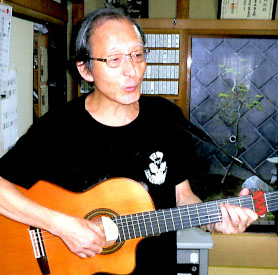The Kokoro no Uta Band

Masamichi KITANI
Kokoro no Uta band leader
When I was a child, many Go apprentices lived in our house, in addition to my own brothers and sisters. At Christmas and other festive occasions, my oldest sister (14 years above me) would get me to sing, accompanying me on the piano. The joy of singing together really rubbed off on me.
As a gift to celebrate me entering high school, another sister (slightly older than me) bought me a guitar. From that day on, I always had my guitar with me and enjoying singing along with everyone.
In July 2001, when I was 53, a small home-based day-care center for senior citizens opened about three minutes from my house. For some reason, I started to sing and play the guitar there. Once again, I enjoyed the fun of singing along with others. I usually sing with the elderly. When there was a major earthquake, I sang along with people at the evacuation center.
In March 2007 I ran my first full marathon, and I retired a little ahead of schedule from the Tokyo Metropolitan Government.
In 2009 I formed the Kokoro no Uta Band. I was joined by DS Take DS (hearing impaired, sign language singer), Yasuaki Maruyama (voice percussion), Morihide Idenawa (base), Yasuko Miki (piano). Later we were joined by Kazuko Sano (percussion, sign language interpreter) and Haruna Kurishiro (vocals). Each one of them was incredibly skillful, and I was fortunate to sing with them. From 2008 we started holding concerts in the large hall at the Shinjuku Bunka Center, just like the professional bands, even though we were just a group of amateurs.
In 2011 when the Great East Japan Earthquake Disaster struck, we sang at the evacuation center at the Utatsu Junior High School, in Minamisanriku Town, Miyagi Prefecture. In 2013 we began music activities with people with higher brain dysfunction and their families. From 2014 our band also took part in the “Go-supporting Ofunato City” event. From February 2017 I taught Go to people with higher brain dysfunction and their families at the Disability Support Center in Ota Ward, Tokyo, and we sang with them. A lot of amazing things happen and become really precious memories.
Now, at the beginning of 2020, the coronavirus is threatening the world. We are forced to live in isolation, away from events and contact with other people. When I learned about ZOOM video conferencing in early March, I intuitively felt that this was essential in helping me to respond to the corona virus and to the aftermath of any future major earthquake in Tokyo. We have begun a new chapter in our lives.
